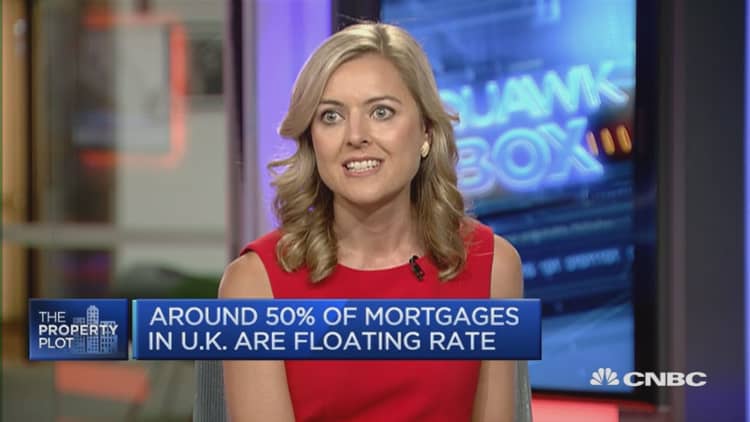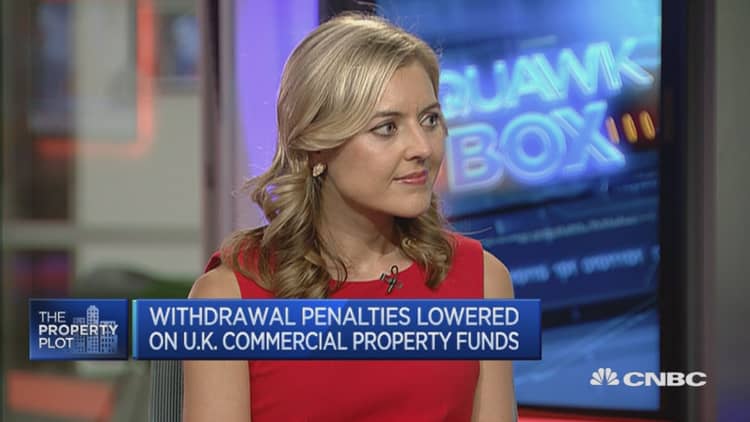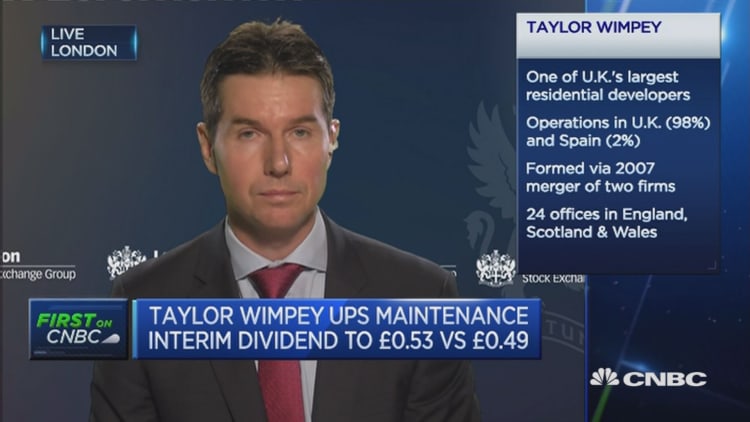


Thursday's Bank of England (BOE) announcement has left analysts contemplating what it could mean for the U.K. property market, which has seen strong price gains in recent years.
Homeowners are also closely watching what the rate cut could mean for home loans, with tracker mortgages - where the interest rate varies according to the BOE's base rate - being extremely popular in the country.
The extent to which the 0.25 percent cut will prompt a surge in new interest for mortgages is debatable – and arguably, limited – yet according to Charlie Campbell, sector analyst at Liberum, that's not what excited investors.
"Housebuilder shares reacted positively to the combination of QE (quantitative easing) and the Term Funding Scheme (TFS), rather than the long-anticipated rate cut. The two programs should help keep rates lower for longer and continue to put downward pressure on mortgage rates," he told CNBC.
BOE Governor Mark Carney's vigorous emphasis on banks' responsibility to push the easing measures through to the domestic economy ensured disappointment at the initial responses of certain mortgage providers.
While all of the main lenders announced the full cut would be passed through to their tracker mortgages, only HSBC and First Direct plan to do so immediately, with Barclays, Coventry, Nationwide, Lloyds and Halifax opting to delay the benefit to customers until September - although they themselves benefit immediately. Meanwhile, Clydesdale said it's still reviewing plans - this despite ample forewarning that a rate cut was likely.
House price growth slows
Younger buyers and Londoners tend to take on more mortgage debt than the national average so it's hoped the measures will aid certain parts of the markets where accessing the housing ladder is particularly difficult.
Nonetheless, according to the latest data out from Nationwide, despite mortgage rates having been pinned at very low levels for years, affordability is at record lows on the basis of price inflation. House prices are around six times earnings for the U.K. as a whole versus an historical average of four times earnings. For London, this worsens to 12 times currently, around double its historical average.
Friday's house price index out from Halifax showed that although monthly U.K. house price growth dropped by 1.0 percent during July, on an annual basis, the market recorded an 8.4 percent rise. But according to Martin Ellis, Halifax's housing economist, there are some signs of prices relenting.
"Housing demand has been firm as a result of very low mortgage rates, rising real incomes and high employment. At the same time, supply has been extremely low, adding to upward pressure on prices. There are, however, signs that the underlying pace of price growth has been slowing in recent months," he told CNBC.
He also cautioned against reading too much into monthly numbers, telling CNBC: "The monthly figures can be erratic and it is important not to read too much into July's fall."
However, a report out from estate agent Knight Frank this week focused solely on prime central London property which showed a more definite trend with an annual slide in prices of 1.5 percent.
House ownership declines
The impact of the affordability crisis was highlighted by U.K. think tank Resolution Foundation in a report this week showing home ownership in the country sinking to 63.8 percent, a depth not plumbed since 1986.
The data showed the trend spilling beyond London, particularly into larger northern U.K. cities, with Manchester recording the largest drop.
Supply concerns amplify
The lack of housing supply and the inadequate pace of new home building came sharply into focus during the London Mayoral campaigns during the Spring, with two lead candidates both putting the issue at the top of their agendas.
But data out this week showing U.K. construction PMI (purchasing manager's index) plummeting to 45.9 – even lower than June's miserable 46.0 read – has led to elevated concerns about the prospects for new home supply. Industry employment also slipped for the first time in three years.
According to Phil Harris, head of sales for BLP Insurance: "The construction PMI reflects a significant reduction in confidence. This is compounded by rising project costs as a result of the fall in the value of the pound, in turn increasing the cost of imported building materials ... although fundamental conditions within the residential sector remain largely constant, there is no doubt that we have a period of turbulence ahead, particularly in the commercial sector."
Michael Dall, lead economist at intelligence firm Barbour ABI echoed the concerns over sentiment: "Construction has definitely taken a hit post referendum but perhaps not as severe may have been expected. The real issue is that drops in confidence recorded by the PMI surveys means concerns over future investment," he said.


